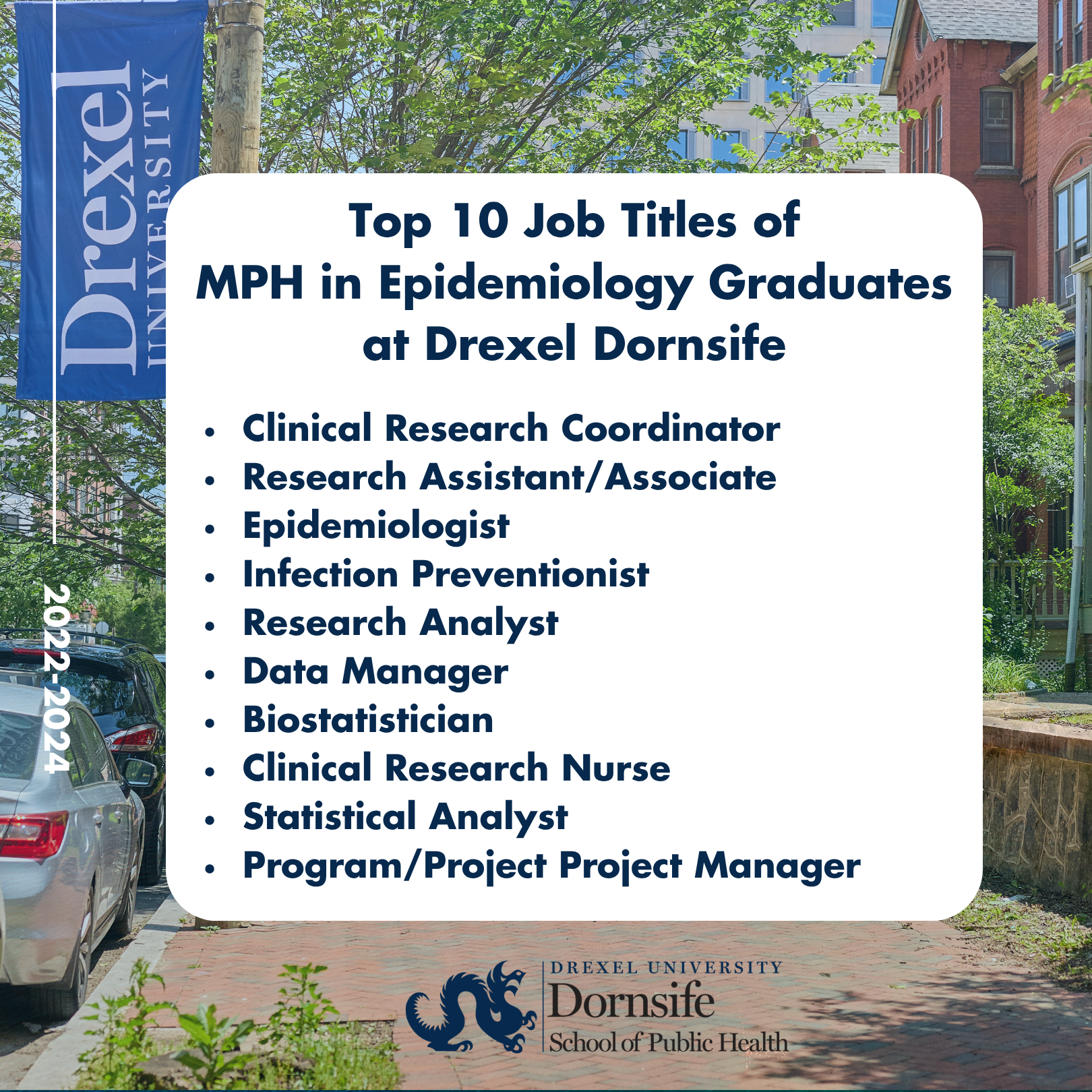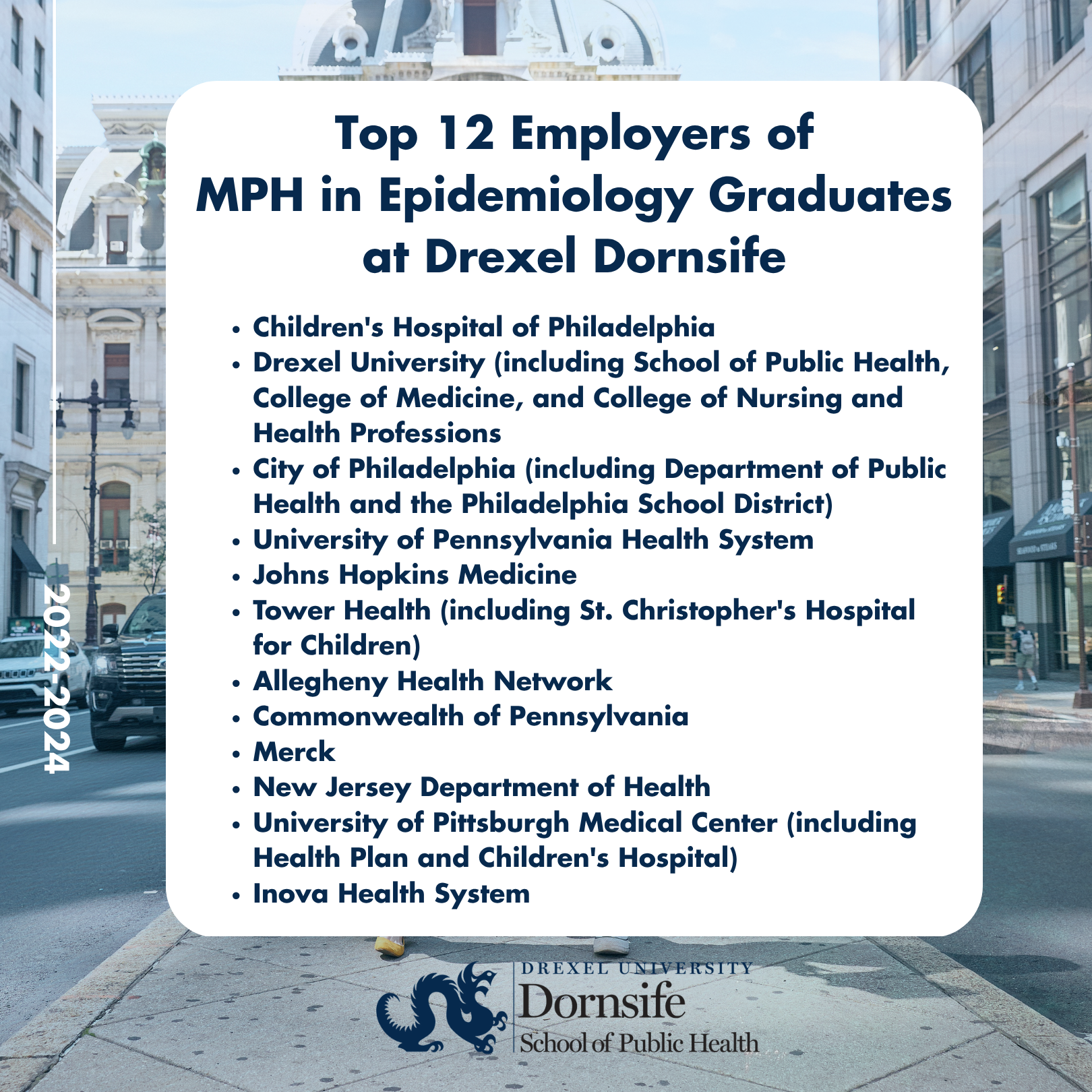What Is an MPH in Epidemiology?
The Master of Public Health (MPH) in Epidemiology is an in-person, on-campus graduate degree program at Drexel University's Dornsife School of Public Health.
Students can choose to complete the program on a full-time basis in either 18 or 21 months. For students considering a part-time schedule, there is also a 33-month online only option.
Students in the MPH in Epidemiology program learn to characterize, monitor, and understand the health of populations by applying quantitative approaches.
Why Should You Get an MPH in Epidemiology at Drexel Dornsife?
Epidemiology students at Drexel University's Dornsife School of Public Health join a CEPH-accredited program at the #1 graduate school of public health in Philadelphia.
This STEM designated degree program continues to grow and expand its course offerings, research portfolio, and community partnerships.
Real-world practical experiences complement the coursework and focus on understanding disease treatment and prevention in populations.
Epidemiology faculty in the department of Epidemiology and Biostatistics work in a variety of settings and communities. They bring knowledge from the field into the classroom and integrate students into research on important health issues including social inequalities in health, neighborhood differences in health, chronic and infectious disease epidemiology, the epidemiology of health across life stages, nutrition, and clinical research.
What is the Difference Between an MPH and PhD in Epidemiology?
The MPH in Epidemiology is a 56-credit program focused on data collection, analyses, and interpretation to inform policy and practice. The MPH allows students to strengthen their research skills while also gaining experience through public health practice. It includes a public health practicum.
The PhD in Epidemiology program provides epidemiologists with further training. The program has a minimum of 54 quarter credit hours of course work beyond the master’s degree and includes completion of a a dissertation. According to the Bureau of Labor Statistics, a PhD is common for "epidemiologists who direct research projects" and those who "work as postsecondary teachers in colleges and universities."
Alternatives to the on-campus MPH in Epidemiology program include the Online MPH in Epidemiology and the Online MS in Infection Prevention and Control.
Admission Requirements for the Epidemiology Masters Program
To be considered for the Masters of Public Health program, students should have a bachelor's degree from a regionally accredited college or university, or an equivalent international institution. Graduates of any major may apply.
A GPA of at least 3.0 is preferred. Those with lower GPAs are encouraged to apply, highlighting their interest in public health.
Application Requirements for the Epidemiology Masters Program
Applicants for MPH admissions are asked to submit the following:
- SOPHAS online application
- Official transcripts from every college-level institution you attended (academic records from institutions outside the U.S. must undergo a credentials evaluation)
- English proficiency test score, if applicable
- Three letters of recommendation
- Resume or curriculum vitae
- Statement of Purpose and Objectives
Applications for the Master of Public Health do not require the GRE.
Apply via SOPHAS – the Centralized Application Service for Public Health
Application Deadlines
Applicants interested in being considered for funding through one of the school’s endowed scholarships or fellowships are encouraged to apply no later than January 15.
The fall application deadline for international students is June 1.
The regular decision deadline for all fall programs is August 1.
Applicants to the Epidemiology MPH should submit their application and materials through SOPHAS – the Centralized Application Service for Public Health.
Major Competencies in Epidemiology
MPH students majoring in Epidemiology develop skills and competencies including the following:
- Define a problem and formulate a testable hypothesis
- Review and critically evaluate the validity of the design, analysis, and interpretation of findings from published research studies
- Create and manage datasets appropriate for epidemiologic analyses from sources such as surveillance, large-scale data (i.e, Big Data, such as electronic medical records, administrative claims data), or other health-related research
- Conduct univariable and multivariable regression and other semi- and non-parametric analytic techniques of an epidemiologic data set using a standard statistical software package
- Create effective peer-review quality written and visual summaries of analysis results
MPH in Epidemiology Curriculum
Core Courses
All MPH students complete the same core public health courses to begin their MPH studies.
These courses lay the foundation for an advanced education in public health before students break off into their respective concentrations.
MPH in Epidemiology Required Courses
Required courses for the Epidemiology concentration include:
- Introduction to Statistical Computing – 3 credits
- Intermediate Biostatistics I – 3 credits
- Intermediate Epidemiology – 3 credits
- Research and Practice in Epidemiology – 3 credits
Students earn a total of 56 quarter credits to complete the MPH degree.
View a Sample Plan of Study
Elective Courses
Electives serve to further focus an MPH student’s academic work and define their career goals. Many students use their electives to complete a graduate minor.
Epidemiology MPH Degree Requirements
Completion of the MPH in Epidemiology requires:
To learn more about the MPH in Epidemiology degree, please follow the link below:
Review Degree Requirements and Courses
Epidemiology Applied Practical Experience
The Applied Practical Experience (APE) is a supervised, hands-on practical experience.
Through the APE Dornsife MPH students gain career experience while earning their degree.
Students engage in the practice of public health, working with an external organization to expand their skills and network outside the classroom.
Epidemiology Integrative Learning Experience
The Integrative Learning Experience (ILE) is a 3-credit project over the final two quarters of the program. Students develop a hypothesis based on a public health problem and perform a multivariable analysis to test the hypothesis using an appropriate dataset.
The goal is to develop skills and gain experience in self-directed learning. Students complete a high-quality written product and oral presentation at the end of the experience. See examples of recent epidemiology ILEs at Dornsife School of Public Health.
What Can You Do With an MPH in Epidemiology?
With an MPH in Epidemiology, individuals have the opportunity to explore various career paths. Some common epidemiology MPH jobs include:
- Epidemiologist
- Research Analyst
- Data Scientist
- Clinical Research Coordinator
Top 10 Job Titles of Drexel Dornsife Epidemiology MPH Graduates:

Are Epidemiologists in Demand?
According to the Bureau of Labor Statistics, the median salary for an epidemiologist is approximately $83,980/year, with the typical entry level education being a master's degree.
The job outlook for epidemiologists is much faster than average, projected to grow 19% between 2023 and 2033 (BLS).
Top 12 Employers of Drexel Dornsife Epidemiology MPH Graduates:

The MPH in Epidemiology program also offers a fully online option. Learn more.
If you are interested in learning more about any of our MPH programs at Drexel Dornsife, request more information to speak with our admissions team.
Drexel Dornsife Epidemiology MPH Outcomes at 12 Months*
94%
Employed or continuing education
94%
satisfaction with how their job contributes to society
$71,647
Average salary of new grads
*Epidemiology MPH graduates as reported 9-12 months after graduation. Most recent three graduation years.